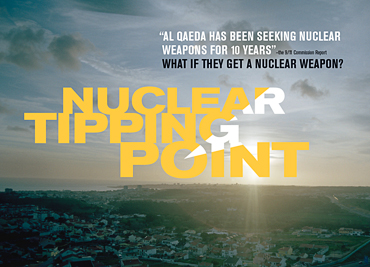On August 6, PeaceQuest Cape Breton will join communities around the world in remembering the bombings of the Japanese cities of Hiroshima and Nagasaki during World War II. This year, they will host a screening of the film Nuclear Tipping Point at Cape Breton University on August 6. PeaceQuest member Sean Howard characterizes the film as “the clearest indication so far of how the debate about nuclear weapons has changed in the last few years,” and as a strong call for an end to nuclear proliferation.
The film was produced after former US Secretary of State William Kissinger, former Secretary of State William J Perry, former Senator Sam Nunn and former Secretary of State George P. Shultz together wrote two influential op-eds in the New York Times outlining the dangers of nuclear proliferation. Each of the authors were once among the power brokers that helped shape 20th century nuclear-oriented security, strategies they now denounce as ineffective and dangerous. They argue that if serious steps are not taken to address nuclear proliferation over the next 10 years, that there will likely be a terrorist attack with nuclear weapons or another type of nuclear exchange.
Howard, an adjunct professor of Political Science explained that the film’s message was a powerful one. “It’s much more powerful in a way, when you hear it from people who were converted to the cause because they realized that everything they believed in no longer means anything. These weapons don’t deter, they have no value, they’re just dangerous. So the only solution is a radical one.”
Concern over nuclear weapons can often associated with the Cold War and 20th Century peace movements, but Howard explained that nuclear weapons are an ongoing concern that has merely evolved with the times rather than a problem that ended with the Cold War. “The justification for nuclear weapons in the Cold War was a very clear cut one of deterrence in the context of the confrontation between the USA and the USSR.” explained Howard, though with emphasis that he disagreed with the strategy. “Now after the Cold War there had been a proliferation, most states have the weapons and terrorist groups want to get the weapsons. We’re in a situation now where there’s no one to deter…who are you going to bomb if Al Qaeda attacks someone? They’re not a country. So the whole rationale of people who believe in these weapons has collapsed out from under them.”
PeaceQuest Cape Breton was founded after the 9/11 attacks. It began as an initiative of the Catholic organization Sisters of Charity, but functions as a non-denominational organization that includes atheists and people of other faith backgrounds and walks of life. Its Hiroshima Day memorial is the group’s signature event, and over the years, PeaceQuest has launched local campaigns and joined with larger ones, including opposition to the Iraq war, annual observation of the UN International Day of Peace in September 21, and an ongoing effort to get the CBRM to join Mayors For Peace.
The screening will take place at 6:30pm August 6 at the Royal bank Lecture Theatre at Cape Breton University. Admission is free, and refreshments will be available afterwards.


